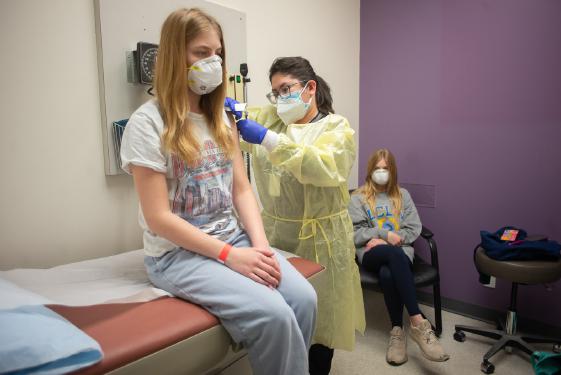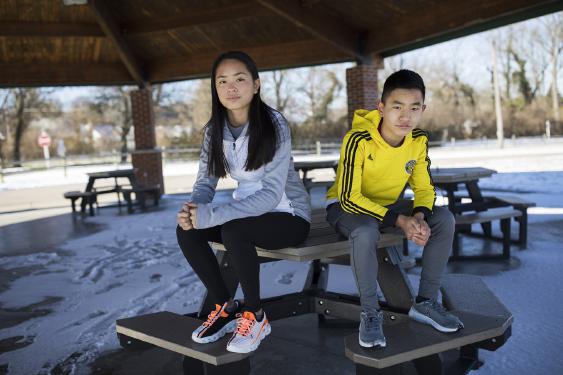Teens volunteer for vaccine trials in bid to get their lives back
Vaccinating educators will be an important factor in keeping schools open, but vaccinating students will also be a key element

Your support helps us to tell the story
From reproductive rights to climate change to Big Tech, The Independent is on the ground when the story is developing. Whether it's investigating the financials of Elon Musk's pro-Trump PAC or producing our latest documentary, 'The A Word', which shines a light on the American women fighting for reproductive rights, we know how important it is to parse out the facts from the messaging.
At such a critical moment in US history, we need reporters on the ground. Your donation allows us to keep sending journalists to speak to both sides of the story.
The Independent is trusted by Americans across the entire political spectrum. And unlike many other quality news outlets, we choose not to lock Americans out of our reporting and analysis with paywalls. We believe quality journalism should be available to everyone, paid for by those who can afford it.
Your support makes all the difference.To get out of a ninth-grade (year 10) science class one recent Friday, the King twins had an excuse that is so very 2021.
Alexandra and Isabelle King, 14, had to miss a class — including a test — because they were participating in an actual science experiment: a clinical trial of Moderna’s Covid-19 vaccine to evaluate whether the shot is effective and safe in children ages 12-17.
“In science we’re learning about, like, genetics and stuff like that,” Alexandra said during the monitoring period after they’d gotten their shots at a Houston clinic. “So maybe the teacher will say, ‘Oh, you really shouldn’t have to take the test, because you’re contributing to science already.’”
Teenagers contract the novel coronavirus almost twice as often as younger children, but vaccines authorized in the United States are mostly for adults — Moderna’s for 18 and older, Pfizer’s for 16 and up.
While teenagers don’t become severely ill from the virus as often as adults, research suggests that because they are often asymptomatic and casual about social distancing, they can be efficient spreaders — to one another as well as to adults like parents, grandparents and teachers. Although vaccinating educators will be an important factor in keeping schools open, vaccinating students will also be a key element.
Bottom line: If widespread immunity to the coronavirus is to be achieved, adolescents are critical links. They need a Covid vaccine that works for them.
But teenagers are harder than adults to enroll and keep in clinical trials. They are difficult to wrangle and not so great with compliance, which includes keeping a symptom diary and keeping appointments, as many as six a year, that include blood draws (for some, an instant deal-breaker).
To reach students, some researchers have tapped school connections, local paediatricians and social media campaigns. While waiting for appointments in vaccine research clinics, some teenagers, ignoring advice to keep their vaccine volunteering off social media, have posted TikTok videos, which have inspired friends to sign up. But the adolescent Covid vaccine trials will be much smaller than the adult trials — 2,000 to 3,000 subjects instead of 30,000.
“You want to enroll as many kids as necessary but as few as possible, to expose as few as possible,” said Dr Robert W. Frenck, director of the Vaccine Research Center at Cincinnati Children’s Hospital Medical Center.
To enroll in a trial, children must give “assent,” a legally required, age-appropriate version of “consent.” But researchers must also obtain the parent’s consent or permission. Information sessions for each can be protracted and painstaking. Objection by either child or parent terminates the application.
“Parents may be willing to put themselves in a study but not their children,” said Dr James Campbell, a pediatric infectious disease expert at the University of Maryland School of Medicine who conducts vaccine trials. “Their key role in life, as parents, is to keep their children safe and they may choose to wait until a vaccine is licensed rather than enrol their child in a trial.”
Often researchers give young subjects an additional caution. Because vaccine disinformation and online personal attacks are so widespread, youth volunteers should avoid discussing their role in the trial on social media.
Although the coronavirus has had far less effect on children than older adults, some 2.2 million pediatric cases in the United States have been reported and about 280 children have died, according to the Centers for Disease Control and Prevention. About 2,060 children have contracted a dangerous rare condition related to the coronavirus called multisystem inflammatory syndrome, which can shut down the heart and other organs.
And like an enemy occupation, the pandemic has taken over most children’s lives — shutting down in-person school, sports, socializing. That has prompted some teenagers, who otherwise feel so powerless, to fight back by volunteering for vaccine trials.
Sam, 12, who entered the Pfizer trial at Cincinnati Children’s Hospital, said he wanted to participate “because it would be helping science and beat the pandemic. And it was my way of saying thank you to the front-line workers who are keeping us healthy.”
His sister, Audrey, 14, who is also in the study, said, “I thought this would be a really good story I could tell my children and grandchildren — that I tried to help create the vaccine.”

“And I also thought it is important to have people of different ages and races represented,” added Audrey, who, like her brother, is Asian. (Their mother, Rachel, a nurse researcher who volunteered for a vaccine trial, asked that their last names be withheld for privacy reasons.)
Overall, the teen trials may be less diverse, because results from adult trials showed no discernible difference in outcome by race. And because the adult trials were so successful, up to two-thirds of teenagers may be offered the actual vaccine rather than a placebo.
Pfizer, whose trial is fully enrolled, expects results from its trials for children ages 12-15 in the first quarter of this year, which it will then submit to the Food and Drug Administration for review. Moderna is still recruiting for its adolescent trials, with data anticipated sometime this summer. Other companies expect to start adolescent trials soon. Shortly after, researchers will open trials for children as young as 5, most likely with more modest doses.
As in any medical trial, investigators are evenhanded when discussing risks and benefits. Rather than lecturing young subjects, Campbell, whose clinic will conduct a Moderna trial for younger children, engages them in conversation.
“Do you remember your tetanus shot? Tell me about it,” he might say. And then, “Here’s how this is similar and how it’s different.” He wants to make sure the teenager is actively involved in decision-making. “We always say, ‘Don’t do this for your parents.’”
Dr Sarah Hasan, lead recruiter for DM Clinical Research, which oversees the Houston Fights Covid campaign and most of the city’s vaccine trials, said that information sessions for adolescents and adults differ strikingly. She has more fun with the teenagers.
“Usually adults will skim the form, ask a few questions and they’re done,” she said. “But kids ask way more questions than adults and they’re actually listening, which is pretty nice.”
“Of course,” she added, “they also want to know if the doses will turn them into zombies.”
During adult trials, when participants were leery and results unknown, no-shows for appointments were common, Hasan said. But teenagers “come on time and are being super-compliant.”
Another issue in enrollment is compensation. Researchers typically offer volunteers money to cover time and travel expenses but the amount cannot be substantial enough to seem like an inducement. The going rate is about $15 (10.79) an hour. The Cincinnati Pfizer trial compensates parents too, reasoning that they contribute time and money, as unofficial chauffeurs for the young subjects.
In Houston, the King sisters were already fantasizing about how they would spend the money.
Alexandra’s impulses were immediately generous. Now she could buy presents for others that her father typically paid for. “It’ll definitely be something nice to do, like, I earned it by getting a shot in the arm to help people. And now at least I can buy Christmas gifts for my mom,” she said.
Her sister Isabelle hastily chimed in that, of course, she too would use the money for something selfless. Then she did allow, “Well, my closet could use an update.”
This summer, Monica Mitchell, a community health educator who works for Cincinnati Children’s, participated in a Pfizer vaccine trial. Her daughter Melanie, a high school junior, was deeply curious, but at that point, volunteers had to be at least 16 years old. On the day she turned 16, Melanie called to enroll.
Both mother and daughter have become ambassadors for the vaccine. “Someone said to me, ‘You’re doing the white man’s work,’” recounted Melanie, who is Black. “And I said, ‘No, it’s the opposite. I’m doing the work for my people.’”
Mitchell, who is also a pediatric psychologist and researcher, got some criticism for allowing her daughter to enter a vaccine trial. “Some relatives asked, “‘Why would you do that?’ But at least they understand that Melanie is fairly independent and they know she made her own decision” Mitchell said.
Like most trial volunteers, children worry about side effects. Sure enough, after Sam got the second dose from Cincinnati Children’s hospital, he had a rough go of it.
In the middle of the night he woke with a throbbing headache. Then chills, a low-grade fever, muscle aches.
“He looked miserable,” said his mother, Rachel. “It’s one thing to talk theoretically about side effects but it was hard as a mom to see him feeling really bad.”
She felt guilty for having encouraged him to participate. “I’m so sorry,” she said.
Sam was mystified by her reaction. “I’m so happy,” he replied. “This means I got the real thing!”
Audrey, his sister, felt fine after her dose. “I’m jealous,” she said.
Article courtesy of the New York Times





Join our commenting forum
Join thought-provoking conversations, follow other Independent readers and see their replies
Comments